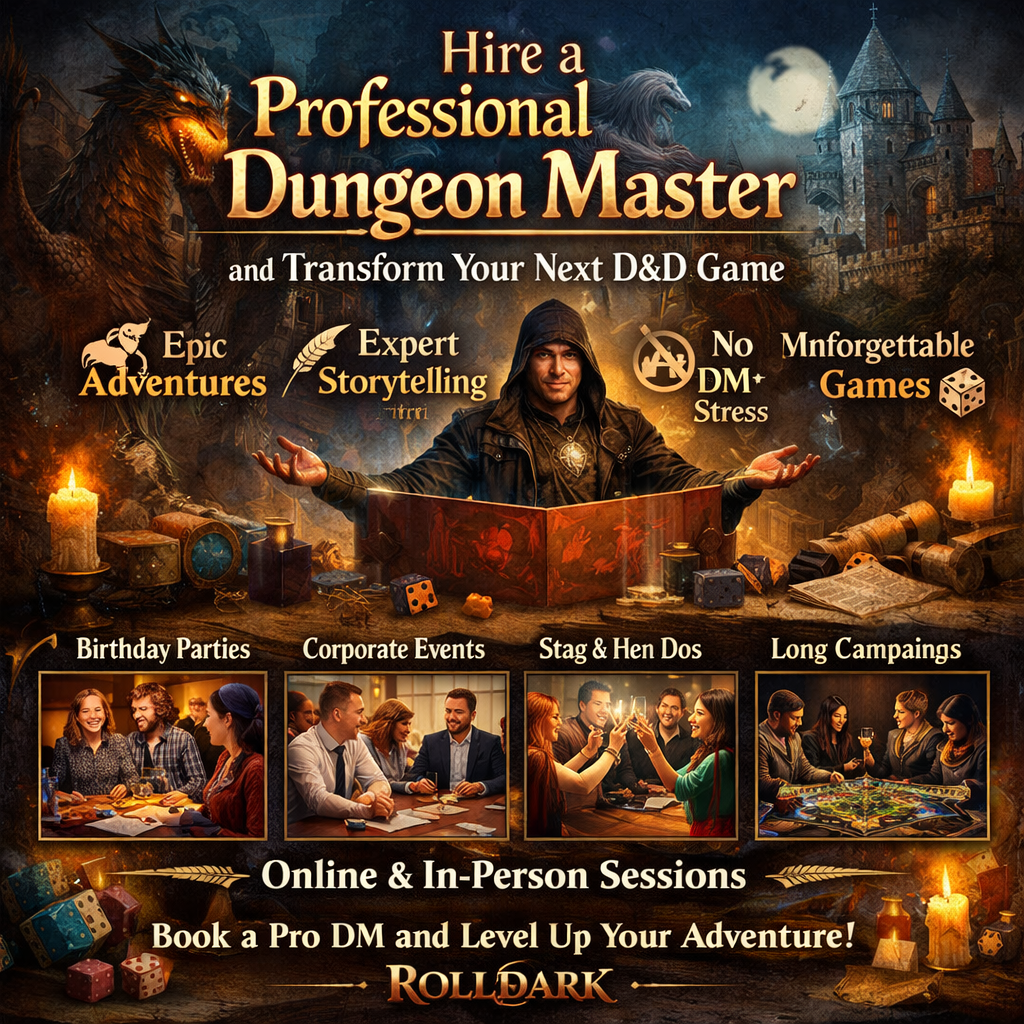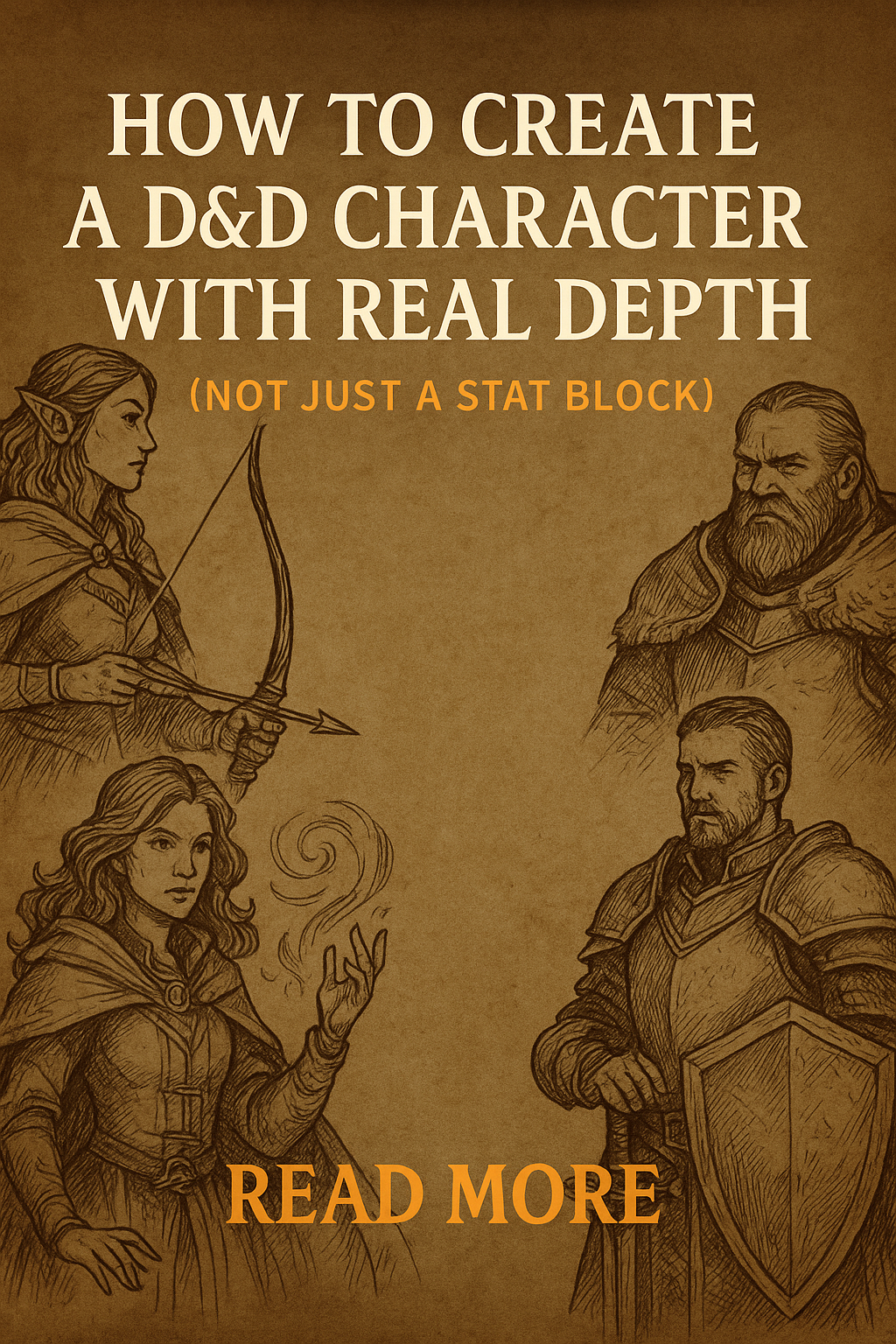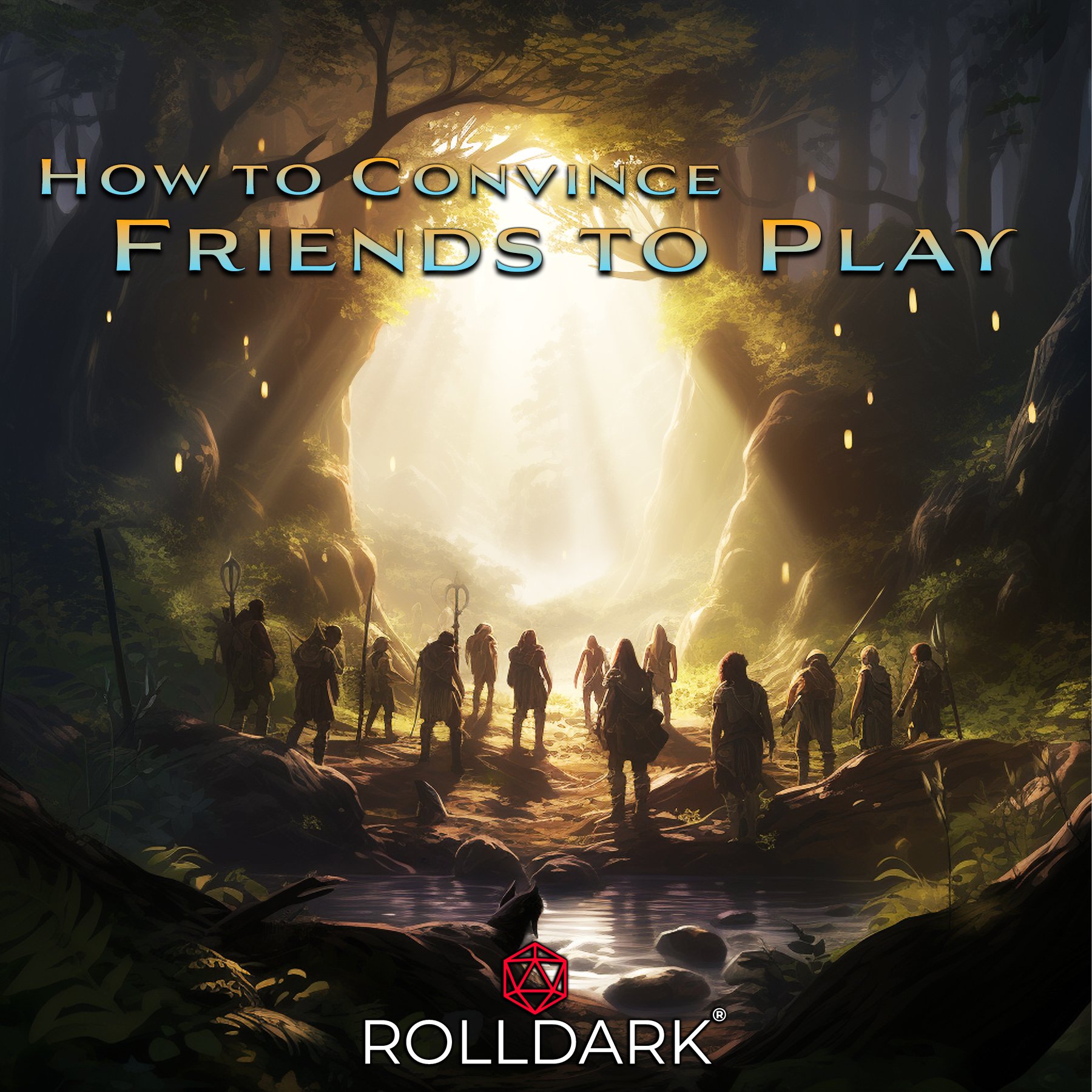What to Expect in Your First Tabletop RPG Session: A Guide for New Players
What to Expect in Your First Tabletop RPG Session: A Guide for New Players
Why Hiring a Dungeon Master Could Be the Best D&D Decision You Ever Make
The truth is, most people who want to play D&D never actually get around to it. Why? Because organising a game is harder than it looks. You need someone who knows the rules, can create an exciting story, run the monsters, keep everyone engaged, and stop the whole thing descending into chaos. That’s the Dungeon Master’s job — and at Rolldark, it’s exactly what we do.
How to Create a D&D Character with Real Depth (Not Just a Stat Block)
Most players want their character to feel alive, but many fall into tropes or flat archetypes. This article would walk them through layered backstory creation, flaws and contradictions, and goals that evolve with the story.
How to Tell Cinematic Stories in TTRPGs
Cinematic storytelling isn’t about overwriting or acting out a screenplay. It’s about intention. It’s about treating your scenes like they matter. A flash of lightning reveals the truth. A hand held too long. The blood on the blade. A single, unforgettable sentence.
Bring those instincts to the table, and your game won’t just feel good. It’ll feel like it belongs on screen.
Beyond Dungeons and Dragons: Roleplay Systems Every DM Should Explore to Level Up Their Skills
The best Dungeon Masters are those who continuously study, experiment, and learn from different systems. Each of these roleplay games offers valuable tools and perspectives that will help you craft richer stories, create more memorable characters, and design unforgettable adventures. So take the time to read, play, or even watch actual plays of these systems. Your players will thank you for it.
The Secret Ingredient Your D&D Game Is Missing (And It Is Not What You Think)
Three Simple Ways To Build Emotion Into Your Game
1. Foreshadow More Than You Think You Should
Your big reveals will not land if they come out of nowhere. Instead, leave breadcrumbs. A broken locket. A child’s song about the monster in the woods. A guard’s nervous glance at a closed gate. Let your players feel like they could have known.
2. Focus On The Small Moments
Epic battles are great, but it is the little moments that make your world feel alive. The player who comforts a frightened villager. The choice to share rations with a beggar. The quiet talk around a campfire. That is what makes your players care.
3. Let There Be Real Risk
If nothing is ever truly at stake, your players will not feel the tension. Let failure be possible. Let success feel earned. And make sure player choices shape the world. That is what creates true investment.
Grow as a Seasoned D&D Veteran
D&D is a constantly evolving game, with new content, rules, and adventures being released regularly. Stay updated on the latest materials, whether it’s a new sourcebook, adventure module, or official update. This ensures you’re always aware of new possibilities for your characters and campaigns.
Additionally, learn from other experienced players by watching live-play streams, reading articles, and listening to podcasts. Seeing how others approach the game can offer fresh perspectives and inspire you to try new techniques or strategies.
ROLEPLAY - like an absolute boss
Characters should evolve. Consider how your experiences in-game affect your character’s personality, beliefs, and relationships.
Growth and Change: Did your character’s outlook on life shift after a significant event? How do they react to new situations now compared to earlier in the campaign?
Relationships: Develop connections with other characters. This can lead to rich, emotionally charged interactions.
Fun Idea: Keep a journal from your character’s perspective. This can help you track their development and better understand their thoughts and feelings.
Building a World Through an Ecosystem
‘Delicious in Dungeon’ on Netflix offers a unique take on fantasy adventure. The series revolves around adventurers journeying through a dungeon to confront a Dragon. However, what sets it apart is their unconventional approach to survival—they feast on the dungeon's monsters instead of carrying their provisions, leading to comedic mishaps.
Dungeons & Dragons Alternatives: A Journey Through Roleplaying Games
The history of roleplaying games (RPGs) is a tale of imagination, storytelling, and communal adventure. At the heart of this captivating narrative stands Dungeons & Dragons (D&D), a game that has enthralled generations of players with its immersive worlds and imaginative quests. While D&D is undoubtedly a titan in the RPG universe, it's important to recognize that the RPG landscape is vast and teeming with fantastic alternatives. In this article, we'll take you on a journey through the history of RPGs and introduce you to a selection of other RPGs that are as good as D&D, each with its unique charm and offerings.
The Gateway to Imagination - Get your Pals to Play TTRPGs
Start by emphasising the collaborative storytelling aspect of TTRPGs. Let your friends know they will have the opportunity to craft their characters, make decisions that shape the story, and navigate through thrilling challenges together. Paint a picture of the epic tales you'll create as a team and how their input will be crucial in driving the narrative forward.
Unveiling the Secrets: How to Become a Professional Dungeon Master for Hire
Dungeons & Dragons (D&D) has taken the world by storm, and behind every epic adventure lies a skilled Dungeon Master (DM). If you've ever fantasized about turning your passion for storytelling and role-playing into a profession, becoming a professional Dungeon Master might be the perfect career choice. In this article, we will guide you through the key steps and requirements to embark on this exciting journey, including the opportunity to work with the renowned Rolldark Game Master Academy. Whether you dream of being a professional DM for hire or running child-friendly games, we have you covered.
Become a Better Dungeon Master
A great DM is a master storyteller who can paint vivid pictures with their words. To improve your storytelling skills, read books, watch movies, and study the works of other successful DMs. Note how they use description, dialogue, and pacing to create tension and build excitement. When creating your own story, try to incorporate suspense, mystery, and surprise elements to keep players on the edge of their seats.
How to Play Dungeons & Dragons
The most exciting aspect of D&D is creating your character. Race, class, and background determine your character’s abilities, skills, and personality. You can choose from various races, such as humans, elves, dwarves, and halflings, which determine your character’s physical traits and abilities. Your character’s class defines their abilities, skills, and role in the party, while the background provides flavour and backstory to your character.
Become a Fantastic D&D Player
Courage is another crucial element of D&D. Players must be brave in the face of challenges and obstacles. Taking risks is important, as it can lead to new discoveries and experiences. Embracing a character's fears or weaknesses can be rewarding, as it allows players to overcome their limitations. Standing up for one's beliefs or values, even if it goes against the rest of the party, can also demonstrate courage.
Conquer the Warrior - DND Class Guide
Warriors have access to a wide range of weapons, from longswords and greatswords to bows and crossbows. Choose weapons that suit your playstyle and the situation you're in. For example, if you're fighting in close quarters, you may want to use a sword or axe, while a bow or crossbow may be more effective if you're fighting from a distance.



















